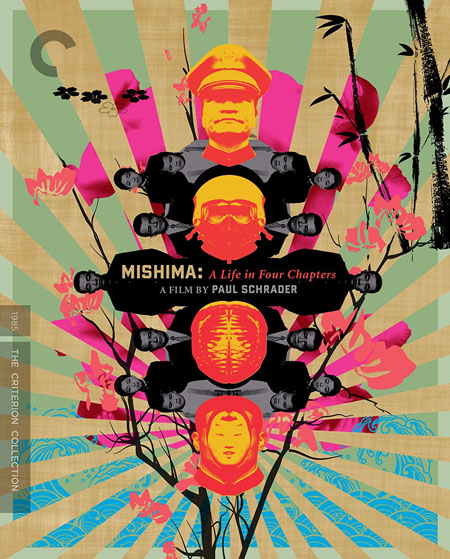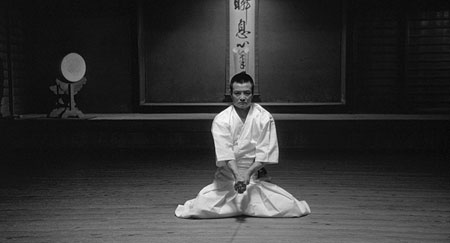
“DEATH AS ARTâ€
By Raymond Benson
Note: I reviewed the Criterion
Collection’s 2008 DVD release of this film here at Cinema Retro. The product has now been upgraded to
Blu-ray by the company. Much of the following is excerpted and/or revised from
the original review, while also addressing the new Blu-ray.
Paul
Schrader has always opined that Mishima—A
Life in Four Chapters is his best film as a director, and I must agree.
Originally released in 1985 (and executive produced by Francis Ford Coppola and
George Lucas), the film is a fascinating bio-pic about controversial Japanese
author/actor Yukio Mishima. Schrader, a successful screenwriter who has also
had an interesting hit-and-miss career as a director, co-wrote the film with
his brother Leonard and filmed it in Japan with a Japanese cast and crew.
Ironically, the film was banned in Japan upon its release due to the
controversial nature of Mishima’s infamously public display of seppuku (suicide) in 1970.
But
despite Mishima’s questionable act, there is no doubt that he was a formidable
novelist, poet, and artist—certainly one of his country’s greatest. Schrader’s
film attempts to visualize Mishima’s life and work, as well as make sense of his
final days in three different stylistic approaches that are beautiful to behold
and brilliant in conception.
The
“present†(that is, 1970) is in color, filmed realistically, almost
documentary-like, as we follow Mishima (expertly played by Ken Ogata) and his
cadets travel to and subsequently take control of a Japanese military base in
Tokyo so that he can deliver his public manifesto and commit seppuku. The past—the events of
Mishima’s childhood and rise to fame—is in black and white, almost as if we are
watching film noir. The motion
picture also presents dramatizations of scenes from some of the author’s
novels. These are presented in a highly stylized theatricality, in color, with
stage sets and “actors.†The narrative ingeniously jumps between these three
arcs, revealing the psyche of a complicated, but brilliant, artist. Why would
he kill himself as an artistic statement? Mishima—A
Life in Four Chapters attempts to explain this enigma.

Philip
Glass provides one of his most admirable motion picture scores to date, John
Bailey’s cinematography is exquisitely gorgeous, and Eiko Ishioka’s production
designs are perfectly suited to Schrader’s sensibilities. Whether or not you
know anything about Yukio Mishima, you will find the picture to be an
extraordinary cinematic experience.
The
Criterion Collection has done another outstanding job of producing a new,
restored 4K digital transfer of the director’s cut, which was supervised and
approved by Schrader and Bailey. There are optional English and Japanese
voiceover narrations (by Roy Scheider and Ken Ogata, respectively—the U.S.
theatrical release only had the Scheider narration). Personally, I agree with
Schrader’s view that the English-language narration by Scheider is preferable;
otherwise there are too many subtitles on the screen when simultaneously
translating the narration as well as the Japanese speakers. (There is an
additional “early†Scheider narration that I’m not sure adds much to the
viewing experience.) The film comes with an audio commentary by Schrader and
producer Alan Poul, recorded in 2006.
The
supplements are ported over from the original DVD release. This wealth of material
includes the excellent 1985 BBC documentary The
Strange Case of Yukio Mishima. There are vintage video interviews with
Mishima himself; more recent segments with Mishima’s biographers and
translators, Philip Glass, John Bailey, and other members of the film crew; and
the trailer. The booklet features an essay by critic Kevin Jackson, a piece on
the film’s censorship in Japan, and photographs of Ishioka’s sets.
Mishima—A Life in
Four Chapters is
a beautiful, emotionally-powerful film that is an immersive, visual and aural
treat. Highly recommended.
CLICK HERE TO ORDER FROM AMAZON